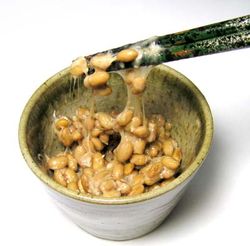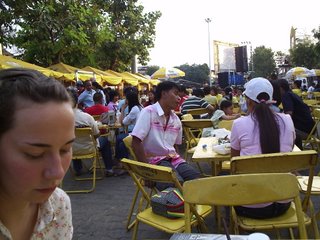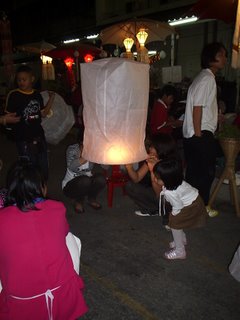Nure ochiba zoku-- clammy, fallen leaves or a retired husband who, having retired, sticks to his wife like a sodden mass.
Many wives find the newly ever-present husband an extreme annoyance. Some develop Retired Husband Syndrome [seriously! This is a diagnosis!] while others choose divorce.
But hope is not lost! Read on:
Japanese men turn on charm
By HIROKO TABUCHI
TOKYO — Mitsutoshi Fukatsu has been with his wife for
three decades, but their lives have grown apart. As
a busy stationmaster in central Japan, he has usually
come home only to eat, bathe and sleep.
Now with retirement looming, he wants to get to know
his wife better. He calls her by her name, Setsuko,
instead of just grunting. And he says he recently
learned a new phrase: "I love you."
Fukatsu, 56, is among a small but growing group of
men who took part in Japan's second annual "Beloved
Wives Day" last week in hopes of salvaging their marriages
by doing something different — paying attention to their wives.
"For about a year now, I've been starting to help out
with the housework," Fukatsu said. "I can't stay at
my company for ever. I have to return home. But right
now, I don't feel like I have a place there."
Last year, the Japan Adoring Husbands Association
set itself up and designated Jan. 31 as a day for men to
return home at the unusually early hour of 8 p.m.,
look into their wives' eyes, and say, "Thank you."
On Wednesday, the village where the association is
based held a renewal-of-vows ceremony for a local
couple in their 50s and handed out prizes to three
top "doting husbands."
The movement is small — about 230 people posted
messages on the group's Web page about this year's
event. But it represents quite a change for a
generation of Japanese men taught to care about
their companies first and their wives a distant second.
Among the forces driving the change are demographics and money.
This year, the first postwar baby boomers will reach
60 and retire, meaning an unprecedented number of
men will have to abandon their home-away-from-home — the
all-consuming office — and spend more time with their wives.
Meanwhile, an impending law change gives a housewife a
bigger share of her husband's pension, which could
trigger a surge in divorces as women take the money and run.
Japan's divorce rate is relatively low — 2.08 per
1,000 couples — but the number has increased more
than 60 percent since 1985 to 261,917 in 2005, according
to government statistics.
Divorce among those married for more than 20 years
has grown the fastest, nearly doubling since 1985 to
more than 40,000 couples in 2005 — with separation more
likely to be initiated by women. That leaves their
ex-husbands to face a lonely old age in a country
where the average male lifespan is more than 78
years, one of the world's longest.
Sadao Ito, 67, wishes he had been more sensitive to
his wife's feelings. She left him seven years ago,
just as he was facing retirement from a busy office
job in the northern city of Sendai. Even the
couple's daughter and two sons blame him for the breakup, Ito
said.
"My wife took care of me so well. She made me
breakfast every day, and did all the housework. But
I never did anything in return," he said.
Ito now acts as a volunteer adviser to the Adoring
Husbands Association, which was founded in 2005 in
Tsumagoi village, north of Tokyo.
"Repent, repent, repent. That's what I do every
day," Ito said. "My wife didn't take a single family album
with her. I realized then that I had driven her
away."
Tsumagoi, whose name sounds like the words "wife
love" in Japanese, is marketing itself as a romantic
destination for married couples.
Last year, it invited couples to an event called
"Shout Your Love from the Middle of a Cabbage Patch"
— where husbands took turns hollering romantic
messages against a backdrop of Tsumagoi's wide open fields.
About 100 people came.
That was where Mitsutoshi Fukatsu finally told his
wife, Aishiteru (I love you) — rehearsing it 20
times.
"I had never told Setsuko I love her — not like
that. But now I want to say it more often. ... It feels
nice," he said.











